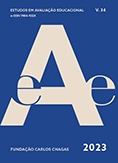Redesigning the faculty assessment tool in an undergraduate Pharmacy course
DOI:
https://doi.org/10.18222/eae.v34.8858Keywords:
Faculty Performance Evaluation, Assessment Instruments, Higher EducationAbstract
The present study reports the development of a questionnaire for ongoing evaluation in a Pharmacy course. A literature review and discussions involving Pedagogical Support and the Undergraduate Committee were conducted, resulting in the first version of the questionnaire with 20 items. This was analyzed by experts and submitted to a pre-test with undergraduate students. After the adjustment stage, the Questionário de Avaliação Continuada [Continuous Assessment Questionnaire] (CAQ) was elaborated with 21 items, and 383 undergraduate students responded to it. The maximum score was reached by 5.48% of the respondents, suggesting that the CAQ presents evidence of content validity and that the process of redesigning the ongoing assessment described can facilitate other higher education institutions that are experiencing similar scenarios.
Downloads
References
Alves, M. P., Cunha, P. F., Lourenço, A. A., & Monteiro, A. P. (2018). Percepção dos professores sobre a avaliação do desempenho docente. Revista Portuguesa de Educação, 31(1), 61-78. https://doi.org/10.21814/rpe.14082 DOI: https://doi.org/10.21814/rpe.14082
Bittencourt, H. R., Creutzberg, M., Rodrigues A. C. de M., Casartelli, A. de O., & Freitas, A. L. S. de. (2011). Desenvolvimento e validação de um instrumento para avaliação de disciplinas na educação superior. Estudos em Avaliação Educacional, 22(48), 91-113. https://doi.org/10.18222/eae224820111994 DOI: https://doi.org/10.18222/eae224820111994
Diamantopoulos, A., Riefler, P., & Zeugner-Roth, K. (2008). Advancing formative measurement models. Journal of Business Research, 61(12), 1203-1218. https://doi.org/10.1016/j.jbusres.2008.01.009 DOI: https://doi.org/10.1016/j.jbusres.2008.01.009
Embirucu, M., Fontes, C., & Almeida, L. (2010). Um indicador para a avaliação do desempenho docente em instituições de ensino superior. Ensaio: Avaliação e Políticas Públicas em Educação, 18(69), 795-820. https://doi.org/10.1590/S0104-40362010000400008 DOI: https://doi.org/10.1590/S0104-40362010000400008
Faculdade de Ciências Farmacêuticas de Ribeirão Preto. (2020). Projeto Pedagógico.
Gomes, C., & Borges, O. (2008). Limite da validade de um instrumento de avaliação docente. Avaliação Psicológica, 7(3), 391-401.
Ministério da Educação (outubro, 2017). Diretrizes Curriculares Nacionais para os Cursos de Farmácia. Conselho Nacional de Educação/Câmara de Educação Superior.
Mokkink, L. B., Terwee, C. B., Knol, D. L., Stratford, P. W., Alonso, J., Patrick, D. L., Bouter, L. M., & Vet, H. C. W. de (2010). The COSMIN checklist for evaluating the methodological quality of studies on measurement properties: A clarification of its content. BMC Medical Research Methodology, 10, Article 22. https://doi.org/10.1186/1471-2288-10-22. DOI: https://doi.org/10.1186/1471-2288-10-22
Pasquali, L. (2010). Instrumentação psicológica: Fundamentos e práticas. Artmed.
Souza, A. C., Alexandre, N. M. C., & Guiradello, E. de B. (2017). Psychometric properties in instruments evaluation of reliability and validity. Epidemiologia e Serviços de Saúde, 26(3) 649-659. https://doi.org/10.5123/s1679-49742017000300022 DOI: https://doi.org/10.5123/S1679-49742017000300022
Streiner, D. L. (2003). Being inconsistent about consistency: When coefficient alpha does and doesn’t matter. Journal of Personality Assessment, 80, 217-222. https://doi.org/10.1207/s15327752jpa8003_01 DOI: https://doi.org/10.1207/S15327752JPA8003_01
Streiner, D. L., & Norman, G. R. (2008). Health measurement scales. A practical guide to their development and use (4a ed.). Oxford University Press. DOI: https://doi.org/10.1093/acprof:oso/9780199231881.001.0001
Terwee, C. B., Bot, S. D. M., Boer, M. R. De, Van der Windt, D. A. W. M., Knol, D. L., Dekker, J., Bouter, L. M., & Vet, H. C. W. de (2007). Quality criteria were proposed for measurement properties of health status questionnaires. Journal of Clinical Epidemiology, 60(1), 34-42. https://doi.org/10.1016/j.jclinepi.2006.03.012 DOI: https://doi.org/10.1016/j.jclinepi.2006.03.012
Vasconcellos, L., & Guedes, L. F. A. (2007). E-surveys: Vantagens e limitações dos questionários eletrônicos via internet no contexto da pesquisa científica. In Anais do 10. SemeAd – Seminários em Administração. FEA-USP.
Vieira, H. C., Castro, A. E. de, & Schuch, V. F., Jr. (2010). O uso de questionários via e-mail em pesquisas acadêmicas sob a ótica dos respondentes. In Anais do 13. SemeAd – Seminários em Administração. FEA-USP.
Published
How to Cite
Issue
Section
License
Copyright (c) 2023 Estudos em Avaliação Educacional

This work is licensed under a Creative Commons Attribution-NonCommercial 4.0 International License.
Authors who publish in this journal agree to the following terms:
a. Authors retain the copyright and grant the journal the right to first publication, with the paper simultaneously licensed under the Creative Commons Attribution License (CC BY 4.0) license that allows the sharing of the paper with acknowledgment of authorship and initial publication in this journal.
b. Authors are authorized to assume additional contracts separately, for non-exclusive distribution of the version of the paper published in this journal (for example publishing in institutional repository or as a book chapter), with acknowledgment of authorship and initial publication in this journal.
c. Authors are allowed and encouraged to publish and distribute their paper on-line (for example in institutional repositories or on their personal page) at any moment before or during the editorial process, as this can generate productive changes, as well as increase the impact and citation of the published paper (See The Effect of Open Access).







